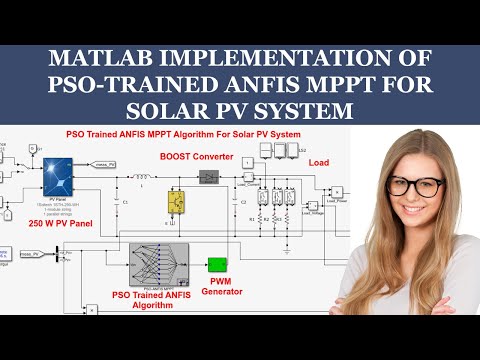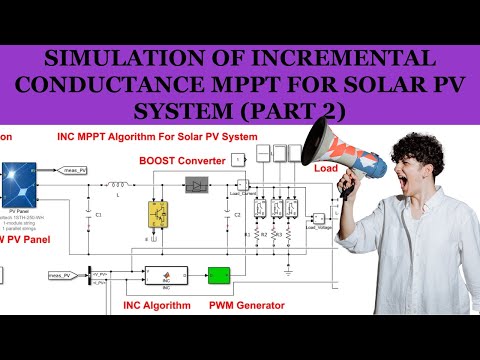MATLAB Model: https://zurl.co/rRQu4
#POMPPT #MPPT #SolarPV #MATLAB #Simulink #RenewableEnergy #Photovoltaics #PowerOptimization #GreenTechnology #EnergyEfficiency
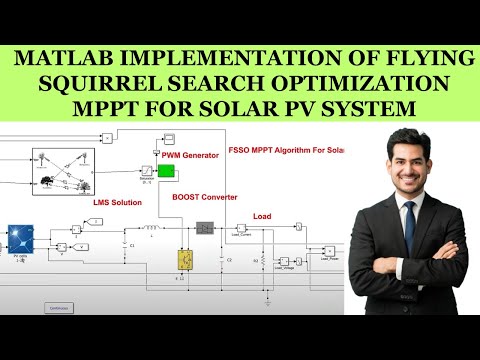
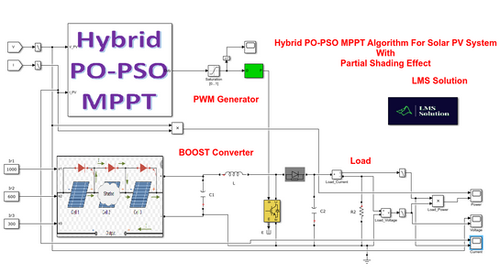
Conventional maximum power point tracking (MPPT) methods such as the perturb-and-observe (P&O) method can only track the first local maximum point and stop progressing to the next maximum point. MPPT methods based on particle swarm optimization (PSO) have been proposed to track the global maximum point (GMP). However, the problem with the PSO method is that the time required for convergence may be long if the range of the search space is large. This work proposes a hybrid method, which combines P&O and PSO methods. Both the P&O method and PSO method work parallelly to find the GMP. The advantage of using the proposed hybrid method is that the search space for the PSO is reduced, and hence, the time that is required for convergence can be greatly improved. The excellent performance of the proposed hybrid method is verified by comparing it against the Conventional P&O, and PSO methods using MATLAB Simulation.
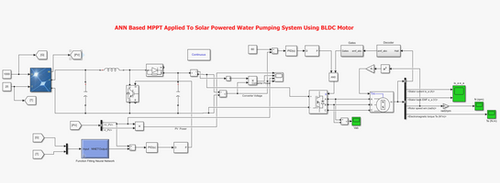
ANN Based MPPT Applied To Solar PV Powered Water Pumping System Using BLDC Motor This work introduces non-electrical input based artificial neural network (ANN) maximum power point tracking (MPPT) technique to the solar PV powered water pumping system using brushless DC (BLDC) motor. The objective is to model a step size independent MPPT using neural network for water pumping application. A DC-DC boost converter is being utilized which is driven by ANN based MPPT to extract maximum power from the solar photovoltaic (SPV) array and also responsible for soft starting of BLDC motor. Pulse width modulated (PWM) control of the voltage source inverter (VSI) using DC link voltage controller is used to control the speed of the BLDC motor. PWM signal is generated using the inbuilt encoder to perform the electronic commutation by hall signal sensing. Performance analysis of a BLDC motor driving pump system is carried out under the MATLAB/Simulink environment and efficiency of the overall system is calculated under various irradiance condition.
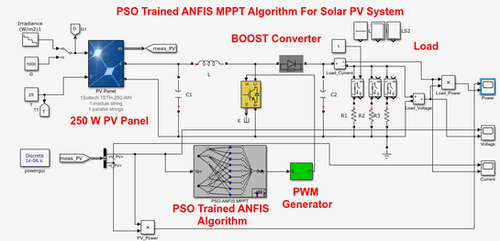
In this Work, an ANFIS technique using experimental data is designed for predicting the maximum power point of a photovoltaic array. An ANFIS model training strategy is challenging due to the variations in the training and the operation conditions of a photovoltaic system. In order to improve ANFIS model accuracy, the Particle Swarm Optimisation (PSO) algorithm is utilized to find the best topology and to calculate the optimum initial weights of the ANFIS model. Hence, the dilemma between computational time and the best-fitting regression of the ANFIS model is addressed, as well as the mean squared error being minimized. To evaluate the proposed method, a MATLAB/Simulink model for an installed photovoltaic system is developed. The results show that the optimized feedforward ANFIS technique based on the PSO algorithm using real data predicts the maximum power point accurately.
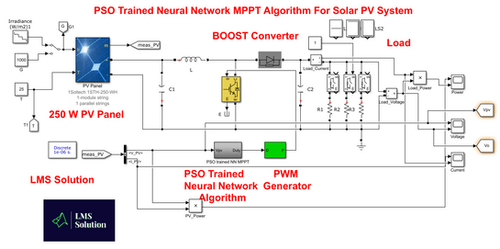
In this Work, a feed-forward Artificial Neural Network (ANN) technique using experimental data is designed for predicting the maximum power point of a photovoltaic array. An ANN model training strategy is challenging due to the variations in the training and the operation conditions of a photovoltaic system. In order to improve ANN model accuracy, the Particle Swarm Optimisation (PSO) algorithm is utilized to find the best topology and to calculate the optimum initial weights of the ANN model. Hence, the dilemma between computational time and the best-fitting regression of the ANN model is addressed, as well as the mean squared error being minimized. To evaluate the proposed method, a MATLAB/Simulink model for an installed photovoltaic system is developed. The results show that the optimized feedforward ANN technique based on the PSO algorithm using real data predicts the maximum power point accurately.
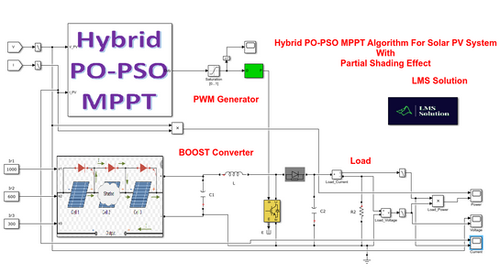
Conventional maximum power point tracking (MPPT) methods such as the perturb-and-observe (P&O) method can only track the first local maximum point and stop progressing to the next maximum point. MPPT methods based on particle swarm optimization (PSO) have been proposed to track the global maximum point (GMP). However, the problem with the PSO method is that the time required for convergence may be long if the range of the search space is large. This work proposes a hybrid method, which combines P&O and PSO methods. Both the P&O method and PSO method work parallelly to find the GMP. The advantage of using the proposed hybrid method is that the search space for the PSO is reduced, and hence, the time that is required for convergence can be greatly improved. The excellent performance of the proposed hybrid method is verified by comparing it against the Conventional P&O, and PSO methods using MATLAB Simulation.

ANN Based MPPT Applied To Solar PV Powered Water Pumping System Using BLDC Motor This work introduces non-electrical input based artificial neural network (ANN) maximum power point tracking (MPPT) technique to the solar PV powered water pumping system using brushless DC (BLDC) motor. The objective is to model a step size independent MPPT using neural network for water pumping application. A DC-DC boost converter is being utilized which is driven by ANN based MPPT to extract maximum power from the solar photovoltaic (SPV) array and also responsible for soft starting of BLDC motor. Pulse width modulated (PWM) control of the voltage source inverter (VSI) using DC link voltage controller is used to control the speed of the BLDC motor. PWM signal is generated using the inbuilt encoder to perform the electronic commutation by hall signal sensing. Performance analysis of a BLDC motor driving pump system is carried out under the MATLAB/Simulink environment and efficiency of the overall system is calculated under various irradiance condition.
